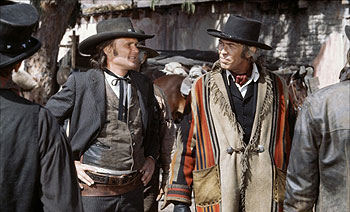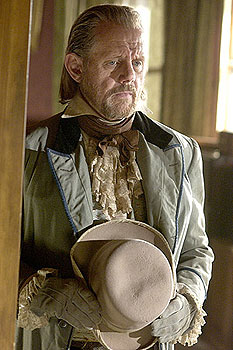“Welcome To Fucking Deadwood.”
Published on July 30th, 2011 in: Issues, My Dream Is On The Screen, TV |
Pat Garrett & Billy the Kid, 1973
Fistful of Dynamite is perhaps Leone’s most overt characterization of this, with its tale of two criminals caught between the grand ideals and power struggles of “those who read the books.” The Mexican Revolution and the abuse of power by the elite is the backdrop which turns Juan Miranda (Rod Steiger) from a petty criminal into a hero, something which both Leone and Peckinpah fixated on. Hearst does this for Al Swearengen: He is a bad guy, but he still has a code. He kills to protect himself, or those he cares for. Hearst ultimately shows that Swearengen has a sense of honor and of justice; he is the ambiguous outlaw who so attracted Leone, Peckinpah, and many others, driving the real moral questions of Deadwood.
In Peckinpah’s The Wild Bunch and Pat Garrett, we see outlaws enlisted by the government to do their bidding. Pat Garrett is particularly unflinching in its portrayal of a land with law, but without justice. One man, Billy the Kid, cannot change and knows in his heart that the modern world has caught up with him, while another, Pat Garrett, knows it’s time to get on the right side of the law, but that to do so, he must kill his old friend.
Neither get out of it alive. They are just pawns; their crimes, as vicious as they are, do not compare to the corrupt, brutal men in government suits who manipulate them for their own ends. Hearst, the Pinkertons, and the Federal Government are these same creatures. There is no evil too petty for these men. (As an aside, Pat Garrett and Billy the Kid is not done justice in its cinematic cut. The re-cut version, currently available on DVD, is far superior, and easily stands beside The Wild Bunch as a seminal Western.)

William Sanderson as E.B. Farnum
Deadwood‘s politics are also one of the most compelling things about the show. Deadwood was an actual place, a gold-rush camp in South Dakota that existed in an illegally occupied territory owned by Native Americans. The move from Deadwood’s lawless state to its eventual annexation by the Dakota Territory is cause for much violence, bribery, and desperation amongst the lawless—and proud of it, goddamnit!—members of the town. Each occupant of Deadwood is aware of how they must become accustomed to lawlessness to ensure their own survival.
As such, there is no character more pitiful, more cowardly, than the owner of the Grand Central Hotel, E.B. Farnum, played with spineless, anal-rimming flair by William Sanderson. E.B. displays a sad kind of love for Swearengen, and the cowardly, but dangerous and bitter soul of this beaten dog is the desperation of Deadwood personified. Love me, please, someone. When Deadwood’s system breaks down with the arrival of the government and George Hearst, it is Farnum who most brilliantly expresses the terror of change.
As with Peckinpah’s work, there is an understanding in Deadwood, even between enemies, that as bad as outlaws and con artists can be, the government and the privileged are liable to be worse. George Hearst, his despicable employee/murderer/sex fiend geologist Francis Wolcott, and his brutish enforcer Captain Joe Turner, represent this unimaginable corruption and power. When Swearengen’s own enforcer Dan Dority, another bad guy who turns into a wonderful anti-hero and unusually honorable man—played by versatile character actor, W. Earl Brown—challenges Joe Turner in “A Two-Headed Beast,” we cheer him on. This fight is perhaps the greatest in the show, as well as the most vicious. When Dority plucks the eye from Turner’s skull, and proceeds to beat him to death, we are relieved that the powerful ones are dealt a defeat, even as they are winning the war for control of Deadwood.
Peckinpah expressed the mentality of “Kill or be Killed” so well that we ended up sympathizing with would-be villains and mourning the loss of outlaws. The death of Pat Garrett, one more man betrayed by a duplicitous system, in the opening moments of the 1973 film, was a rallying cry for those who are forever destined to be outsiders, regardless of their alleged alliances. The concluding shoot-out in The Wild Bunch showed us that there is honor among thieves, outlaws who would rather go to their deaths than to leave their friend to torture. In Deadwood, Dan Dority’s fight with Captain Turner echoes this scene. This is the reclaiming of humanity. We must fight now, for if we look inside ourselves and find nothing but blackness, we are lost. It is a chance, for once, to do what is right, and not what is easy.
Time limit is exhausted. Please reload the CAPTCHA.